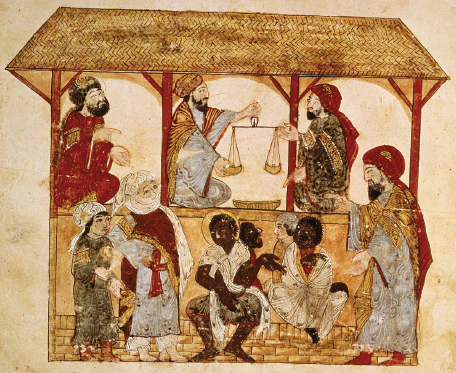Individuals in Society: Ibn Battuta

In 1354 the sultan of Morocco appointed a scribe to write an account of the travels of Abu ’Abdallah Ibn Battuta (1304–
Ibn Battuta was born in Tangiers to a family of legal scholars. As a youth, he studied Muslim law, gained fluency in Arabic, and acquired the qualities considered essential for a civilized Muslim gentleman: courtesy, manners, and the social polish that eases relations among people.
At age twenty-
In the next four years Ibn Battuta traveled to Iraq and to Basra and Baghdad in Persia, then returned to Mecca before sailing down the coast of Africa as far as modern Tanzania. On the return voyage he visited Oman and the Persian Gulf region, then traveled by land across central Arabia to Mecca. Strengthened by his stay in the holy city, he decided to go to India by way of Egypt, Syria, and Anatolia; across the Black Sea to the plains of western Central Asia, detouring to see Constantinople; back to the Asian steppe; east to Khurasan and Afghanistan; and down to Delhi in northern India.
For eight years Ibn Battuta served as a judge in the service of the sultan of Delhi. In 1341 the sultan chose him to lead a diplomatic mission to China. After the expedition was shipwrecked off the southeastern coast of India, Ibn Battuta traveled through southern India, Sri Lanka, and the Maldive Islands. Then he went to China, stopping in Bengal and Sumatra before reaching the southern coast of China, then under Mongol rule. Returning to Mecca in 1346, he set off for home, getting to Morocco in 1349. After a brief trip across the Strait of Gibraltar to Granada, he undertook his last journey, by camel caravan across the Sahara to Mali in the West African Sudan (see “The Kingdom of Mali” in Chapter 10), returning home in 1354. Scholars estimate that he had traveled about seventy-
Ibn Battuta had a driving intellectual curiosity to see and understand the world. At every stop, he sought the learned jurists and pious men at the mosques and madrasas. He marveled at the Lighthouse of Alexandria, then in ruins; at the vast harbor at Kaffa (in southern Ukraine on the Black Sea), whose two hundred Genoese ships were loaded with silks and slaves for the markets at Venice, Cairo, and Damascus; and at the elephants in the sultan’s procession in Delhi, which carried machines that tossed gold and silver coins to the crowds.
Ibn Battuta must have had an iron constitution. Besides walking long distances on his land trips, he endured fevers, dysentery, malaria, the scorching heat of the Sahara, and the freezing cold of the steppe. His thirst for adventure was stronger than his fear of nomadic warriors and bandits on land and the dangers of storms and pirates at sea.
Source: R. E. Dunn, The Adventures of Ibn Battuta: A Muslim Traveler of the Fourteenth Century (Berkeley: University of California Press, 1986).
QUESTIONS FOR ANALYSIS
- Trace the routes of Ibn Battuta’s travels on Map 9.2.
- How did a common Muslim culture facilitate Ibn Battuta’s travels?

DOCUMENT PROJECT
How did Ibn Battuta describe his travels? Read parts of Ibn Battuta’s account of his travels, and then complete a quiz and writing assignment based on the evidence and details from this chapter. See Document Project for Chapter 9